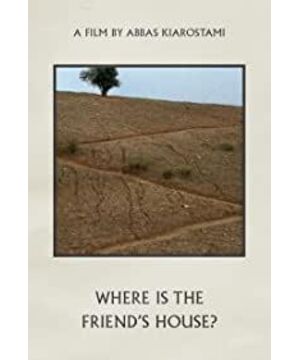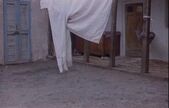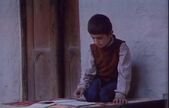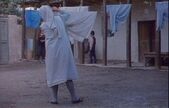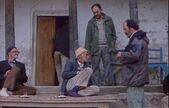In the second half of the film, the old man who made the wooden door volunteered to take Ahmud to find his classmates. On the way, I met a woman selling apples. From the conversation between the old man and her, we could tell that the old man had no children and grandchildren, and he had bad teeth and could no longer eat apples. Then there are his long walks and conversations with Ahmed.
Old man: Why do you want to see your classmates? We can meet at school tomorrow.
Ahmed: I have to return the workbook today.
Old Man: He was there five minutes ago, but he's gone now.
Ahmed: I've been looking for him everywhere, but no one knows him.
Old man: You should come to me directly, whose child are you?
Ahmed: Abdullah.
Old man: Which one?
Ahmed: Abdullah Ahmed.
OLD MAN: Amup of Corgal?
Ahmed: Yes.
Old man: I know him, I helped him do the door, and I also did his son's cradle. I have also done a door for your classmates. I made this door and window forty years ago, (pointing to the door and window on the opposite side, which has a gorgeous reflection on the opposite wall) and it has not changed until now. Now everyone replaced the iron door one by one, but no one asked what was wrong with the wooden door. If the quality of those wooden doors were really questionable, I can guarantee that no one would buy them in the first place. Hello Mashudi!
Mashudi passing by: How are you?
Old man: I'm fine. (Turns to Amud) He's going to replace it with an iron gate too. He heard people say that the iron gate can be used for a lifetime, how do they understand a lifetime? how old are you?
Ahmed: Eight years old.
Old Man: Eight years old. My nephew was eight when he left, and he moved to the city with his dad. See those doors and windows? (pointing to the intricately patterned light and shadow on the opposite wall, one, another one) We two brothers made it together, before he moved out. Have you seen the exquisite handicraft from forty-five years ago? After he got married, he moved to the city. I don't know about the city, but everyone is moving in. Have you been to the city?
Ahmed: Been there twice.
Old man: I don't like the city, there is no sense of belonging there. what is your name
Ahmed: Ahmed.
Old Man: I was very sad when I saw them leave. I can't leave the doors and windows that I have carefully made, I mean these doors and windows, and want to know their final destination. I've been to town a few times to see where they are, but found nothing. I have done very few doors now, as if I lost my nephew, and I have no interest in doing doors anymore. Eyesight and hand strength are poor, and people are really scary. Ahmud, please wait, I have to wash my face before continuing to go, and you also come to wash my face.
Ahmed: I'm in a hurry.
The old man squatting and washing his face: It's almost there, your classmate's house is nearby. The spring water here is really good. Clip this flower in the workbook, being careful not to lose it. (picked a small flower by the faucet and handed it to Ahmed)
While putting Xiaohua in the workbook, Ahmed said: It's late, please hurry up, okay?
Old man: Okay, we'll start again soon. lets go. That's your classmate's home. Be careful and walk slowly. The first door on the left. I'm just sitting here waiting for you. Go and pay it back, I'll wait for you here, and then we'll go back together.
Amud did not find the door, puzzled, tucked the workbook into his clothes and wrapped it around, and walked back.
Old man: Did you give it back to him? I didn't hear you knocking on the door. From this side, you can see the doors and windows I made.
Ahmed: No, it's very late.
Old Man: Come on, let's drop by.
Ahmed: No, it's too late.
Old man: Well, let's go this way, I wanted to show you the doors and windows I made.
Ahmed: It's too late, I still have to buy bread.
Old man: The bakery is closed. You're from Corgal, don't you have a brother? Why doesn't he buy it?
Ahmed: He went to military service. Hurry up, or dad will scold me, don't make him angry.
Old man: I'll walk faster.
Ahmed: You're going too slowly.
Old Man: Is this fast enough? (speeds up to keep up with Ahmed)
Ahmed: Yes. (After walking for a while) Why did you stop? You are walking very slowly.
Old man: I could walk very fast when I was young, is that fast enough? (continues striding)
Ahmed: Hurry up.
old man: hurry up?
Ahmed: Yes.
Old man: I try my best. Is it fast enough?
Ahmed: Yes.
Old Man: Come on, go through here. (gasps as he walks) Do you catch a cold?
Ahmed: No.
old man: is it cold?
Ahmed: Not cold.
Old man: Put on my coat, please?
Ahmed: No, my mother will scold me.
Old man: You can give it back to me tomorrow.
Ahmed: Walk fast.
Old man: I'm not strong enough. If I don't speak, I'll walk faster.
Ahmed: Then you don't talk.
Old man: Okay, I'll stop talking.
Amud looked at the stopped old man: Sir, you are tired. I am also late.
The old man was speechless and waved his hand: I'm tired, let's go.
Ahmed: Okay. (turns and runs)
Ahmed ran into the darkness, heard the dog barking, and was scared to go back the same way.
Old man: Ahmed, what's the matter?
Ahmed: There are dogs barking.
Old man: Are you afraid?
Ahmed: It will bite me.
Old man: So you have to come with me.
Ahmed: You walk slowly, I'm in a hurry.
Old Man: I know I'm too old to keep up with you.
Ahmed: Here we are.
Old man: This is my house, Kegel is on the other side, go ahead by yourself, I will watch you go.
After reading this paragraph, I understand why the first shot starts from the door that is hidden, the door that the children can't close or don't care about, but the teacher insists on closing it. Later, when Amud passed by the entrance of the village, the adults started a dialogue about the wooden gate and the iron gate. An old man who insisted on keeping a dilapidated wooden door was teased by a businessman selling iron doors: Your door will enter the museum.
When the old carpenter appeared, the sky seemed to be bright. Thinking of the night in "The Sweet Life", Marcello and Sylvia stood in the most beautiful fountain pool, and the sky was bright all of a sudden. The light in this film may not be the fleeting moment of happy times. If there is no magic light, how can we show the magnificent light and shadow brought by the doors and windows made by the old man? How can we help the old man demonstrate his wonderful craftsmanship? It was this sudden brightness that made Ahmed firmly and loudly call out to Mr. gentlemen! Wait for him to open the door.
The old man who lived by the dead tree said that we have a lot of dead trees here. When Ahmed spoke to him, he looked up at him, the shadow of the dead tree on his face.
The old man knew everyone in the village. Once, he made the doors and windows of every family, and he also made the cradle of Ahmed's father. Obviously the wooden door is strong and durable. He doesn't understand why everyone likes the iron door, and he doesn't understand why the family wants to live in the city. Everyone says that the iron gate can last a lifetime, but how do you understand "a lifetime"? He even went to the city to look for those abandoned wooden doors, but they were nowhere to be found.
The dialogue between the old man and Ahmud is worth savoring, warm and bitter, simple and heavy. When the old man was talking slowly, Amud probably didn't listen carefully. He was eager to find a friend, but he thought the old man was walking too slowly. The part of the old man's speeding up reminds me of the dancing in "Joy". Even if I suffer from old age and fatigue, I still have to keep up and speed up.
Ahmed and the old man, the former is a child who no one can hear him begging for help, the latter is an old man who no one pays attention to his exquisite craftsmanship, and he clearly abides by the most beautiful moral character, is a small Families are large and important nodes of interpersonal relationships in villages, but they have become marginal people who are not cared for.
After Amud said goodbye to the old man, the camera did not rush to leave the old man, but watched him slowly enter the door, take off his shoes, reveal the hole in the heel of his woolen socks, slowly go upstairs, take off his coat, and continue to work. until he gently closed the window. Just like the moment he appeared.
He closed the window, but he did not leave us. Just as the light in the house poured out through the hollow pattern on the window, just as at the end, when the workbook was spread out, a small flower was in sight. The intensity of this shot is no less than the swaying bouquet at the end of "Close-Up". It is an unexpected laugh and a powerful tear.
Amud relieved his friend's homework crisis with his persistence and wit. This little flower is the blessing of the old man to the children. The old and lonely old man is unable to help the children solve the problems in the current situation of obstacles, but the little flowers are full of great blessings, which are passed on, shared and amplified inside and outside the film. In an instant, I really understood why Abbas said he was pessimistic while still holding out hope. Abbas, who taught us by example, told us in movies that this is not chicken soup. His original words were as follows:
I think life and experience have brought us to the conclusion that despite our pessimism, we cannot live without hope...Bergman seeks the light in the dark, and it is this ray of light that makes his work authentic.
Interestingly, in the second part of the village trilogy, "Life and Flow", we can see that the child with back pain has grown up, and the old man who makes the wooden door is actually not that old, and he is not hunchbacked. He joked that it was the film that asked me to do that, and he didn't understand why art should make young people old, but should make old people young. Carrying a squatting pan, he told the director that the dead have passed away, and the living still use this precious ceramic. He said of the earthquake, "Disasters came like hungry wolves, some were injured and some were alive, but this is not the case. God's law, God loves all people." There is still the tenacity of life in the midst of chatting and laughing.
View more about Where Is the Friend's House? reviews


